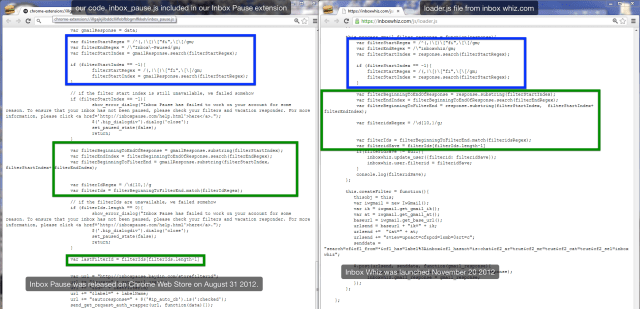Ruh-roh. While we were happy to discover a simple Gmail add-on from Grexit called InboxWhiz that keeps us from our email obsession, competitor Baydin was not so happy, as it turns out. Not happy at all. In fact, Baydin is accusing Grexit of copying its code, and Baydin CEO Alex Moore says the company is submitting a DMCA takedown notice to get Grexit’s extension removed.
Grexit, for those unfamiliar, is better known as the maker of a social task management system for Gmail. InboxWhiz was more of a side effort for the company. Baydin, meanwhile, produces email productivity tools of its own, including Boomerang for Gmail, Boomerang for Outlook, and Boomerang Calendar. (Side note: I actually have Boomerang Calendar installed now – it’s nifty. It turns any mention of a date or time in an email message into a color-coded, clickable link which integrates with your Google Calendar. This is the kind of thing Google should be building in-house, but doesn’t.)
Boomerang for Gmail, to be clear, doesn’t directly compete with the functionality of InboxWhiz – it has different features, like reminders, options to send email later, etc. However, like Grexit, Baydin built its own extension for temporarily stopping incoming mail. This Inbox Pause extension, as it’s called, was released back in August. And Grexit copied parts of it. Explains Moore, Grexit “built the difficult parts of the extension by blatantly copy-and-pasting code from our Inbox Pause extension released in August. We are filing DMCA takedown notices to respond to this copyright infringement, so their extension may cease to work soon,” he says.
But Grexit’s founder Niraj Ranjan Rout responds that Baydin’s accusation that his company had “ripped the difficult parts” was wrong. “We did refer to their extension, but the objectionable section was less than 30 lines in a 600 page file. We have now gone to extra lengths to make sure nothing is even remotely similar, and there is no question of any plagiarism. We even changed sections that did not warrant any changing.”
However, Rout admits that the 30 lines in questions were, indeed, plagiarized. “We responded by modifying our browser extension and informing our IST (linode.com) about the changes,” says Rout about how it’s responding to the DMCA takedown notice.
Moore says that Grexit’s characterization of the issue is wrong. “From our standpoint, it’s not just 30 lines of code – it was like someone took one of your articles, pasted it into a text editor, moved a few sentences and changed a few verbs, but forgot to ‘fix’ a whole paragraph. The products are 95% the same,” he says. “And the directly-copied code is for handling Gmail’s response to a filter creation request with the specific parameters we use.”
Startups are a competitive landscape; “inspiration” and yes, even code copying happens from time to time. But if you’ve knowingly cribbed functionality by copying and pasting code, you’re taking a risk at getting called out. Like this.

